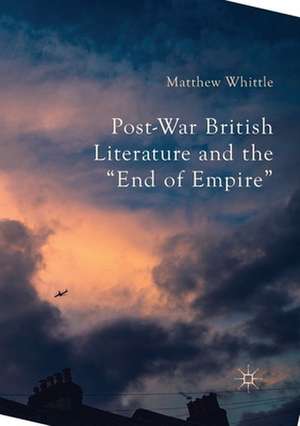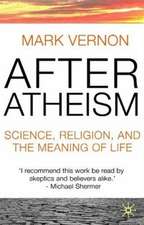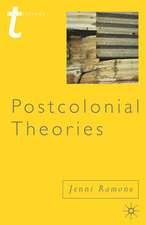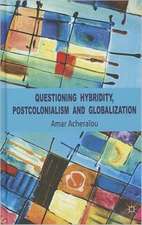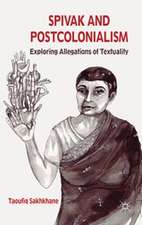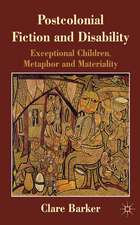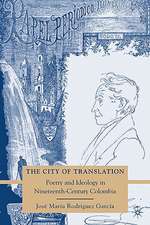Post-War British Literature and the "End of Empire"
Autor Matthew Whittleen Limba Engleză Paperback – 6 noi 2020
| Toate formatele și edițiile | Preț | Express |
|---|---|---|
| Paperback (1) | 382.57 lei 6-8 săpt. | |
| Palgrave Macmillan UK – 6 noi 2020 | 382.57 lei 6-8 săpt. | |
| Hardback (1) | 466.94 lei 6-8 săpt. | |
| Palgrave Macmillan UK – 12 ian 2017 | 466.94 lei 6-8 săpt. |
Preț: 382.57 lei
Nou
Puncte Express: 574
Preț estimativ în valută:
73.21€ • 78.28$ • 61.04£
73.21€ • 78.28$ • 61.04£
Carte tipărită la comandă
Livrare economică 18 aprilie-02 mai
Preluare comenzi: 021 569.72.76
Specificații
ISBN-13: 9781349712090
ISBN-10: 1349712094
Pagini: 225
Ilustrații: IX, 225 p.
Dimensiuni: 148 x 210 x 17 mm
Greutate: 0.29 kg
Ediția:1st ed. 2016
Editura: Palgrave Macmillan UK
Colecția Palgrave Macmillan
Locul publicării:London, United Kingdom
ISBN-10: 1349712094
Pagini: 225
Ilustrații: IX, 225 p.
Dimensiuni: 148 x 210 x 17 mm
Greutate: 0.29 kg
Ediția:1st ed. 2016
Editura: Palgrave Macmillan UK
Colecția Palgrave Macmillan
Locul publicării:London, United Kingdom
Cuprins
1 Introduction.- Part I: The British Abroad.- 2 Decolonisation and the Second World War.- 3 America Moves In: Neo-colonialism and America’s ‘Entertainment Empire’.- Part II: Returning Home.- 4 Englishness in Transition: Moving from the Imperial to the National.- 5 Post-War Immigration and Multicultural Britain.- 6 Coda: Satire and Celebration: Representing Empire in Post-War British Culture.- Notes.- Bibliography.- Index.
Recenzii
“Post-War British Literature and the ‘End of Empire’ makes a useful intervention in the study of English writing in the post-war period, shedding light on how empire was represented by some of its most critical servants at a time of intense change.” (John Brannigan, Modern Language Review, Vol. 114 (4), October, 2019)
Notă biografică
Matthew Whittle is a Teaching Fellow in Contemporary and Postcolonial Literature at the University of Leeds, UK. He has published journal articles and book chapters on post-war British and Caribbean literature, decolonization, postcolonial studies, and contemporary art.
Textul de pe ultima copertă
This book examines literary texts by British colonial servant and settler writers, including Anthony Burgess, Graham Greene, William Golding, and Alan Sillitoe, who depicted the impact of decolonization in the newly independent colonies and at home in Britain. The end of the British Empire was one of the most significant and transformative events in twentieth-century history, marking the beginning of a new world order and having an indelible impact on British culture and society. Literary responses to this moment by those from within Britain offer an enlightening (and often overlooked) exploration of the influence of decolonization on received notions of “race” and class, while also prefiguring conceptions of multiculturalism. As Matthew Whittle argues in this sweeping study, these works not only view decolonization within its global context (alongside the aftermath of the Second World War, the rise of America, and mass immigration) but often propose a solution to imperial decline through cultural renewal.
Caracteristici
Covers an impressive range of literary texts by post-war British writers including Anthony Burgess, Graham Greene, and William Golding Foregrounds his discussion of literature within the larger context of British imperial history particularly as connected to race and class Peels back the layers on the complicated but long-lasting legacies of post-war British writers.
